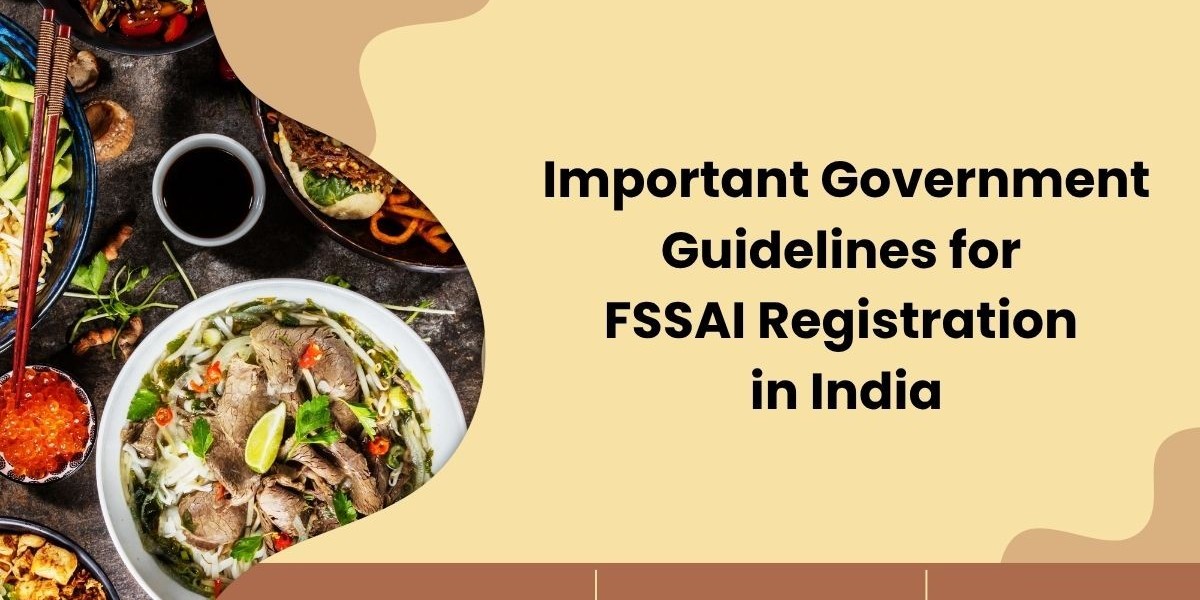In India, food safety is not just a matter of hygiene; it’s a legal obligation for all food business operators. To ensure that the food available to consumers is safe, hygienic, and of good quality, the government has established the Food Safety and Standards Authority of India (FSSAI) under the Food Safety and Standards Act, 2006.
Every food business, whether small or large, is required to obtain an FSSAI Registration or license to legally operate. The process ensures that food businesses comply with government-set standards and maintain consistent safety practices.
In this article, we’ll explore the important government guidelines for FSSAI registration in India, its eligibility, types, and step-by-step procedures to help you stay compliant with Indian food laws.
What Is FSSAI Registration?
The FSSAI Registration is a mandatory process governed by the Food Safety and Standards Authority of India, an autonomous body under the Ministry of Health and Family Welfare, Government of India.
It serves as a certification that the food business adheres to the standards and regulations of food safety as prescribed by the government.
All businesses involved in the manufacturing, processing, packaging, storage, transportation, distribution, or sale of food products must obtain either an FSSAI Registration or an FSSAI License, depending on their scale of operation.
The FSSAI issues a 14-digit registration number, which must be printed on all food packages and displayed at the business premises.
Government Guidelines on Who Needs FSSAI Registration
According to the FSS (Licensing and Registration of Food Businesses) Regulations, 2011, every food business operator (FBO) must obtain an FSSAI certificate. The type of registration or license depends on annual turnover and the scale of business operations.
Here’s a quick breakdown of government guidelines:
Small businesses and petty food manufacturers
Type of Registration/License: FSSAI Basic Registration
Eligibility Criteria: Annual turnover up to ₹12 lakhs
Medium-sized food businesses
Type of Registration/License: FSSAI State License
Eligibility Criteria: Annual turnover between ₹12 lakhs and ₹20 crores
Large-scale or multi-state operators
Type of Registration/License: FSSAI Central License
Eligibility Criteria: Annual turnover above ₹20 crores or operations in multiple states
Businesses that require FSSAI registration include:
Food manufacturers and processors
Repackers and re-labelers
Food transporters and distributors
Storage and cold storage units
Retailers, wholesalers, and caterers
Online food sellers and aggregators (like Zomato, Swiggy)
Hotels, restaurants, and canteens
Even home-based food sellers and cloud kitchens must obtain FSSAI registration before starting their operations.
Key Government Guidelines for FSSAI Registration in India
To ensure food safety and legal compliance, the FSSAI has set forth several rules and guidelines for food businesses in India. Below are the most important ones every FBO should know:
1. Mandatory Registration or Licensing
No person or entity is allowed to carry out a food business without obtaining an FSSAI Registration or License. Operating without one is a violation of Section 31(1) of the Food Safety and Standards Act, 2006, and can lead to penalties, imprisonment, or business closure.
Businesses must apply for the appropriate category of license based on their turnover and scale of operation.
2. Application through the FSSAI Registration Portal
The government mandates that all FSSAI registration applications must be filed online through the fssai registration portal:
Visit the Official Website: Go to the official FSSAI registration website to start your application.
Enter Your Details: Fill in basic information like your name, phone number, email, business name, address, and the type of food you handle.
Upload Your PAN Card: Take a clear photo of your PAN card and upload it as part of the form.
Review and Submit: Double-check all the details you’ve entered. Once everything looks correct, hit the "Submit" button.
Make the Payment: Pay the required fee online through UPI, debit/credit card, or net banking. The fee depends on the size and type of your business.
Verify with OTP Call: You’ll receive a phone call to verify your mobile number. Share the OTP (one-time password) you receive.
Inspection(If Required): In some cases, an FSSAI officer might visit your business location to check hygiene and cleanliness.
Get Your License: After processing, your FSSAI registration/license number will be sent to your registered email ID.
3. Display of FSSAI License Number
As per government guidelines, every FBO must display the FSSAI license or registration number prominently at its place of business.
For packaged food products, the 14-digit FSSAI number must be printed on:
Food labels
Packaging material
Transport vehicles (for bulk carriers)
This helps consumers identify licensed operators and ensures transparency in the food supply chain.
4. Adherence to Food Safety Standards
Every licensed food business must comply with the Food Safety and Standards (Food Product Standards and Food Additives) Regulations, 2011, which define:
Hygiene and sanitation practices
Storage and handling protocols
Permissible food additives
Packaging and labeling requirements
Regular audits and inspections are conducted to ensure compliance with these standards. Non-compliance can lead to suspension or cancellation of the license.
5. Renewal of License on Time
An FSSAI license is valid for a period ranging from 1 to 5 years, as chosen by the applicant during registration.
The renewal application must be submitted at least 30 days before the license expiry.
Failure to renew on time can lead to penalties and the need to reapply as a new business, which may delay operations.
Also Read: FSSAI license for Restaurants – Documents and process
Conclusion
The FSSAI registration is not just a legal formality — it’s a commitment to public health and food safety. By complying with government rules and obtaining the proper FSSAI license, your business earns consumer trust, avoids penalties, and ensures smooth operations in the long run.
Whether you’re running a small bakery, restaurant, or large manufacturing plant, following these important government guidelines for FSSAI registration in India ensures your business operates ethically, transparently, and successfully within the law.







